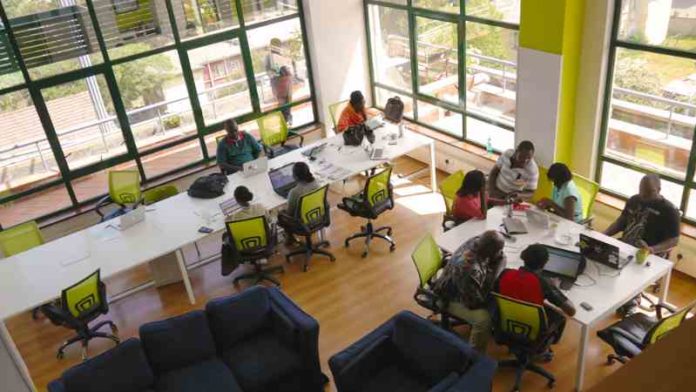By Michael Haapaniemi
Overbearing bosses, office politics, and strict policies are all common reasons people dread going to work. Imagine a workplace where those things don’t exist. A space where like-minded people have the freedom to collaborate, work independently, or take a break and share a beer.
Working in a traditional office comes with harsh fluorescent lights and caged cubicles, hardly the type of space that promotes ingenuity and collaboration. When it comes to working for yourself or working remotely, it seems the only options are home or a coffee shop. Home can pose the issue of isolation which can stifle creativity and productivity. Coffee shops offer a more social environment but can quickly become overstimulating and distracting. All of these options set limitations on work. The solution to reaching full potential is coworking.
A simple definition of coworking is a working environment shared between a community of independent professionals and small businesses. These places are quickly becoming the most desirable way to work, but they aren’t just an update to modern furniture and shared office space. Coworking spaces offer just the right balance of freedom and structure and a culture of collaboration and community.
Flexibility One of the key components that coworking offers, that a traditional office or coffee shop doesn’t, is flexibility. The earliest coworking spaces were created in hopes to foster communities of non-competitive professionals who were encouraged to work independently or collaborate at will. This flexibility continues to be a core value of coworking spaces.
There’s no forced interaction which means if an introvert thrives in a busier environment like a coffee shop but needs just a touch of the structure that offices provide, they can confidently use a coworking space without the worry of socialization. On the other hand, if an extrovert needs socialization to be productive, they can be positive that they’ll find a similar professional to share a conversation with.
Membership choices are also accommodating to all types of professionals, offering anything from come as needed, bullpen-style options to private office spaces all under one roof. Everyone has a style of working that is just as unique as them, so placing professionals into a rigid working environment and expecting high productivity from every member is counterproductive. Coworking offers an adaptable space where everyone’s needs can be met.
Networking Fortune 500 companies are modeling their offices after this coworking concept and they’re reaping the benefits. Some companies will even send their employees to work out of coworking spaces. The biggest value for these companies lies in the networking opportunities available.
Since there’s such a variety of professions working out of one space, there is little need for competition and more opportunity for networking. Different levels and areas of expertise all in one place lends itself to an ideal network of supportive individuals helping each other succeed. If someone is struggling with a section of their project, they may just need a second opinion from an expert in a different field who could very well be sitting across the room. Instead of spending valuable time searching for this help, professionals can take advantage of the community they’re a part of.
Due to their diversity, the networking opportunities that lie in coworking communities are endless. Potential clients, new talent for a start-up, business partners, mentors, or even just an equally ambitious friend can all be found without leaving the building.
The non-competitiveness that surrounds coworking culture is another reason why people thrive in these environments. Individuals can come to work without having to put up any sort of front for competitive reasons. No one is trying to impress the boss or compare accomplishments to seem more successful. This promotes a more relaxed environment most suitable for sharing ideas and creates a comfort that leads to being more productive.
Balance Freedom to work when, where, and how someone wants is one of the most appealing aspects of coworking that allows individuals to thrive. However, there is such a thing as too much freedom and coworking strikes the perfect balance between the abundance of freedom from working at home and the almost nonexistent freedom of an office.
Too much or not enough freedom can influence productivity. Having a place separate from the home that is designated as a workspace, creates just the right balance of routine to keep productivity up. On the other hand, too much routine can stifle creativity and create mental blocks. Allowing the option to leave the office and work out of a coworking space gives enough freedom to boost productivity and new ideas.
Essentially, the culture of flexibility, freedom, collaboration, and community that surrounds coworking is what allows people to thrive in these spaces. It provides the ultimate balance of freedom and structure that humans need to succeed and a network of ambitious individuals ready to help each other prosper. Coworking is for the next generation of purposeful workers who are ready to reach their full potential.
Michael Haapaniemi is the President at Ranch Office, a Texas-inspired space for coworking in Houston, TX. Michael is a proud Northwestern University Wildcat, with a degree in Industrial Engineering, and an undergraduate Certificate in Managerial Analytics from the Kellogg School of Business.
Coworking stock photo by rvdw images/Shutterstock







